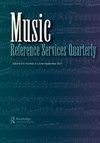The Music Librarian as a Copyright Coach
Q2 Arts and Humanities
引用次数: 0
Abstract
Music librarianship is a complex subfield that requires a good deal of specialized knowledge. The diverse and sometimes unique formats that a music librarian must acquire and describe, as well as the expert language required to address instruction and reference requests in this field, mean that a successful music librarian must develop a particularized body of knowledge to a degree that is often not required, even though sometimes found, in other disciplinespecific library work. Copyright is one such area where the specialized knowledge needed is rather unique for a music librarian, even though all librarians encounter copyright in their daily work. The music librarian who is called upon to “coach copyright” faces a more complicated and shifting set of copyright doctrines and rules than are found in other areas of that body of law. This column tries to outline some of those unique aspects of copyright law that a music librarian as copyright coach will encounter. The idea of librarians as copyright coaches was suggested to me a couple of years ago by an editor at ALA Publishing. The ensuing conversation with my colleague Erin Ellis, who was then Assistant Dean for Research and Learning at the University of Kansas and is now an Associate Dean at Indiana University, resulted in the book Coaching Copyright, published by the ALA in 2019. In that collection of essays, we develop the idea that librarians charged with copyright responsibilities should approach their task very much as coaches approach theirs; the goal is to help others make good decisions and to think strategically about options and potential consequences. After an initial essay that details the contours of copyright coaching, Ellis and Jill Becker of the University of Kansas develop the connections between copyright coaching and the ACRL Framework for Information literacy. The remainder of the essays are case studies that offer ideas and techniques for building knowledge and confidence on copyright issues with faculty and students. The idea of coaching, and the ACRL Framework, provide the threads that connect these contributions into a whole that we hope will be useful to librarians charged with responsibility for a body of law, and a set of practices, that is often counterintuitive and daunting. The metaphor of coaching for those who are asked to field questions and teach both faculty and students about copyright is useful on several levels. By definition, coaches support others who must make decisions in the heat of the game; copyright librarians are in a similar position. By providing tools for decision-making, rather than definitive answers to specific questions, MUSIC REFERENCE SERVICES QUARTERLY 2021, VOL. 24, NOS. 1–2, 3–8 https://doi.org/10.1080/10588167.2020.1822065音乐图书管理员作为版权教练
音乐图书馆是一个复杂的分支领域,需要大量的专业知识。音乐图书馆员必须获得和描述的多样化,有时是独特的格式,以及解决该领域的指导和参考要求所需的专业语言,意味着一个成功的音乐图书馆员必须发展一个特定的知识体系,达到通常不需要的程度,即使有时发现,在其他学科特定的图书馆工作中。版权就是这样一个领域,尽管所有图书管理员在日常工作中都会遇到版权问题,但音乐图书管理员所需要的专业知识是相当独特的。被要求“指导版权”的音乐图书管理员面临着比该法律的其他领域更复杂、更多变的版权理论和规则。本专栏试图概述作为版权教练的音乐图书管理员将遇到的版权法的一些独特方面。几年前,ALA出版社的一位编辑向我提出了图书管理员作为版权教练的想法。随后,我与同事艾琳·埃利斯(Erin Ellis)进行了交谈,她当时是堪萨斯大学负责研究和学习的副院长,现在是印第安纳大学的副院长。我们的谈话促成了《Coaching Copyright》一书的出版,该书由美国教练协会(ALA)于2019年出版。在那本论文集中,我们提出了这样一种观点:承担版权责任的图书馆员应该像教练对待他们的工作一样对待他们的工作;目标是帮助他人做出正确的决定,并从战略上考虑各种选择和潜在的后果。在最初的一篇文章详细描述了版权指导的轮廓之后,堪萨斯大学的埃利斯和吉尔·贝克尔发展了版权指导与ACRL信息素养框架之间的联系。文章的其余部分是案例研究,为教师和学生在版权问题上建立知识和信心提供了想法和技术。指导的想法和ACRL框架提供了将这些贡献连接成一个整体的线索,我们希望这些线索对负责法律主体和一系列实践的图书馆员有用,这通常是违反直觉的,令人生畏的。对于那些被要求回答问题并向教师和学生讲授版权知识的人来说,教练的比喻在几个层面上都是有用的。根据定义,教练支持那些必须在比赛激烈时做出决定的人;版权图书管理员也处于类似的境地。通过提供决策工具,而不是特定问题的明确答案,MUSIC参考服务季刊2021,VOL. 24, no .1 - 2,3 - 8 https://doi.org/10.1080/10588167.2020.1822065
本文章由计算机程序翻译,如有差异,请以英文原文为准。
求助全文
约1分钟内获得全文
求助全文
来源期刊

Music Reference Services Quarterly
Arts and Humanities-Music
CiteScore
0.40
自引率
0.00%
发文量
30
期刊介绍:
Music Reference Services Quarterly is a refereed journal covering all aspects of the management and use of music collections and services in academic, orchestra, public, conservatory, and performing/fine arts libraries, as well as archives and museums. The Journal emphasizes research related to administration and management, bibliographic instruction, collection development, digital audio delivery, electronic resources, facilities, music librarianship education, preservation of music materials, reference services, cataloging, and bibliographies relating to printed music and audio-visual materials. The Journal publishes conceptual papers, literature reviews, practical case studies and opinion pieces. Regular columns include electronic resource reviews, book reviews and interviews.
 求助内容:
求助内容: 应助结果提醒方式:
应助结果提醒方式:


